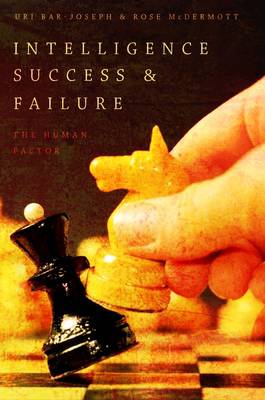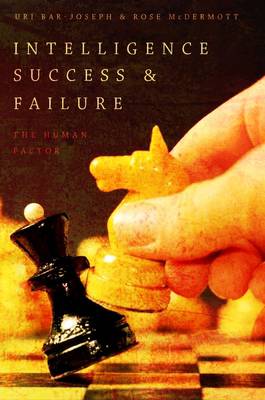
- Afhalen na 1 uur in een winkel met voorraad
- Gratis thuislevering in België vanaf € 30
- Ruim aanbod met 7 miljoen producten
- Afhalen na 1 uur in een winkel met voorraad
- Gratis thuislevering in België vanaf € 30
- Ruim aanbod met 7 miljoen producten
Zoeken
€ 72,45
+ 144 punten
Omschrijving
The study of strategic surprise has long concentrated on important failures that resulted in catastrophes such as Pearl Harbor and the September 11th attacks, and the majority of previously published research in the field determines that such large-scale military failures often stem from defective information-processing systems.
Intelligence Success and Failure challenges this common assertion that catastrophic surprise attacks are the unmistakable products of warning failure alone. Further, Uri Bar-Joseph and Rose McDermott approach this topic uniquely by highlighting the successful cases of strategic surprise, as well as the failures, from a psychological perspective. This book delineates the critical role of individual psychopathologies in precipitating failure by investigating important historical cases.
Bar-Joseph and McDermott use six particular military attacks as examples for their analysis, including: -Barbarossa, - the June 1941 German invasion of the USSR (failure); the fall-winter 1941 battle for Moscow (success); the Arab attack on Israel on Yom Kippur 1973 (failure); and the second Egyptian offensive in the war six days later (success). From these specific cases and others, they analyze the psychological mechanisms through which leaders assess their own fatal mistakes and use the intelligence available to them. Their research examines the factors that contribute to failure and success in responding to strategic surprise and identify the learning process that central decision makers use to facilitate subsequent successes.
Intelligence Success and Failure presents a new theory in the study of strategic surprise that claims the key explanation for warning failure is not unintentional action, but rather, motivated biases in key intelligence and central leaders that null any sense of doubt prior to surprise attacks.
Intelligence Success and Failure challenges this common assertion that catastrophic surprise attacks are the unmistakable products of warning failure alone. Further, Uri Bar-Joseph and Rose McDermott approach this topic uniquely by highlighting the successful cases of strategic surprise, as well as the failures, from a psychological perspective. This book delineates the critical role of individual psychopathologies in precipitating failure by investigating important historical cases.
Bar-Joseph and McDermott use six particular military attacks as examples for their analysis, including: -Barbarossa, - the June 1941 German invasion of the USSR (failure); the fall-winter 1941 battle for Moscow (success); the Arab attack on Israel on Yom Kippur 1973 (failure); and the second Egyptian offensive in the war six days later (success). From these specific cases and others, they analyze the psychological mechanisms through which leaders assess their own fatal mistakes and use the intelligence available to them. Their research examines the factors that contribute to failure and success in responding to strategic surprise and identify the learning process that central decision makers use to facilitate subsequent successes.
Intelligence Success and Failure presents a new theory in the study of strategic surprise that claims the key explanation for warning failure is not unintentional action, but rather, motivated biases in key intelligence and central leaders that null any sense of doubt prior to surprise attacks.
Specificaties
Betrokkenen
- Auteur(s):
- Uitgeverij:
Inhoud
- Aantal bladzijden:
- 280
- Taal:
- Engels
Eigenschappen
- Productcode (EAN):
- 9780199341740
- Verschijningsdatum:
- 4/04/2017
- Uitvoering:
- Paperback
- Formaat:
- Trade paperback (VS)
- Afmetingen:
- 155 mm x 231 mm
- Gewicht:
- 408 g

Alleen bij Standaard Boekhandel
+ 144 punten op je klantenkaart van Standaard Boekhandel
Beoordelingen
We publiceren alleen reviews die voldoen aan de voorwaarden voor reviews. Bekijk onze voorwaarden voor reviews.








